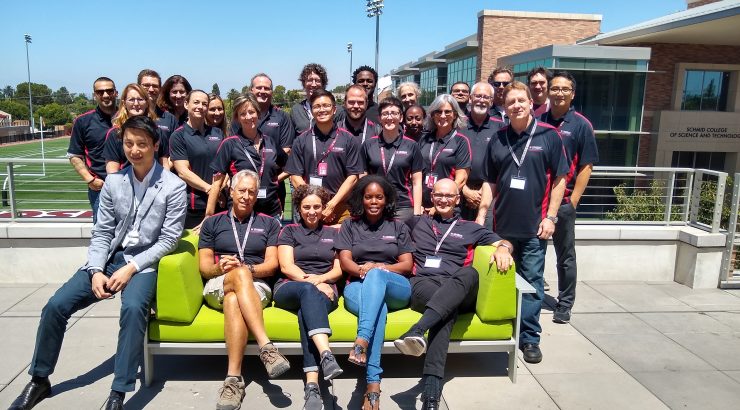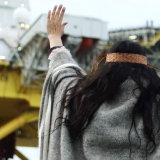
Grant Writer’s Boot Camp Learning through the Grant Process Simulation
August 12, 2020
Through a competitive application process, six Wilkinson College faculty have been selected to participate in the second annual Chapman Grant Writers’ Boot Camp, designed to assist faculty in learning about all phases of applying for external grant funds.
In this simulation of the grant process, faculty will respond to a Request for Proposals (RFP), learn about the details of grant preparation at Chapman, participate in the review process, and revise their proposal. Upon successful completion of the Boot Camp and revision of their mock grant proposals, they will each receive a $4,000 Grant Writers’ Award that can be used as seed funding to further their research and creative efforts.
Let’s take a look at some of the faculty research projects in the works!
Selected Faculty and their Projects:
Modeling the Costs of Perspectival Diversity (to Better Appreciate its Benefits)
Keith Hankins (Philosophy)
Dr. Keith Hankins’ project seeks to develop a better model of the relationship between the costs and benefits of diversity, with an emphasis on the impact that perspectival diversity has on the ability of groups to work together successfully. Here, perspectival diversity refers to diversity that manifests itself in individuals conceptualizing problems differently, taking different approaches to solve these problems, or thinking about the world or their place in it in different ways. This kind of diversity is associated with innovation, creativity, and robustness in contexts ranging from corporate management and science to art, music, and sport. However, while this kind of diversity has long been recognized to present challenges to things like group cohesiveness, most formal models of diversity tend to ignore these costs. This work will provide the foundation for a broader project for which Dr. Hankins will seek external funding with the National Science Foundation’s Division of Social and Economic Sciences.
Assessment and Best Practices: Visual Infrastructures of Covid-19 Messaging in the United States
Claudine Jaenichen (Art)
Professor Jaenichen’s proposed research project will establish a methodology of assessing and evaluating messaging practices used in the United States beginning in March 2020. The goal is to identify any systemic communication gaps with an opportunity to establish best practices for visual communication and guidelines. Prioritizing this research during the next few months means that information is currently relevant and can be effectively addressed in an evidence-based manner. This has the potential to affect human behavior by improving compliance and thereby reducing the burden on first responders and infrastructures, not only for pandemics but other disaster-related events. External funding is envisioned to build on this project and develop an international study of COVID-19 messaging, analysis the cultural and political implications of messaging tactics, and provide an evidence-based prescriptive publication detailing how stylistic elements support specific types of emergency messages, such as those around pandemics, but also wildfires, earthquakes, etc.
Medical Humanities at Chapman University: Curriculum Development
Anna Leahy (English)
Wilkinson College is currently writing a proposal for a National Endowment for the Humanities (NEH) Humanities Connections Planning Grant and expects to follow that proposal with a proposal for an NEH Humanities Connections Implementation Grant. Under these grants, the Planning Committee will develop a new undergraduate Minor in Medical Humanities that will address some of the most pressing questions and complex problems that have long existed and have become increasingly visible as a result of the Covid-19 pandemic. As the ongoing global pandemic demonstrates, medicine, medical science, health, and well-being are inseparable from culture and society—from humans and the ways we live and work. Medical Humanities offers a meaningful bridge among disciplines and recognizes the usefulness of integrative, interdisciplinary approaches to understanding our embodied lives.
Code Becomes Palette: a data-driven public artwork on the Chapman Campus
Lindsay Shen (Escalette Collection)
Wilkinson College’s Escalette Permanent Collection of Art exists to inspire critical thinking, foster interdisciplinary discovery, and strengthen bonds with the community. Rather than being housed in a museum, the Collection functions as a “museum without walls” where artwork is displayed throughout the Chapman campus in hallways, public spaces, and study areas. As part of the Escalette’s ongoing initiative to bridge between disciplines on campus and to connect with the wider community, the Escalette is seeking grant funding for a major public artwork on campus, drawing on research conducted by Chapman faculty. The project objective is to share Chapman research in a public-facing area of campus through the creation of a visual artwork by an internationally renowned artist. Crossing the boundaries between art and computer science, the artist will employ research data to explore creative expression and develop innovative techniques of visualization.
The Big Read: Leading the Conversation of the Significance of Race
Stephanie Takaragawa (Dean’s Office)
Dr. Takaragawa intends to apply for the National Endowment for the Arts Big Read program, which supports dynamic community reading programs, each designed around a single NEA Big Read book. The Big Read grant will be used to support Wilkinson College First-Year Foundations courses and align the classroom experience with a text related to the Engaging the World initiative. ETW’s annual theme is determined by a faculty panel who determine the relevance of humanities driven topics, such as race, identity, gender, environment, poverty, and homelessness. This grant will support purchasing books for the community, partnering with a local library, partnering with local schools, and sponsoring a major event around the selected reading. This opportunity will both reinforce our commitment to our local community beyond the campus while promoting interdisciplinary academic and community conversations across the university. These collective endeavors, inside and outside the classroom, give expression to our shared humanity and promote fresh ways of seeing, thinking, and creating.
Morality, Norms, and Conventions
John Thrasher (Philosophy)
The goal of Dr. Thrasher’s project is to make progress on understanding a central question at the heart of moral philosophy and the social sciences, by developing a framework for testing the distinction between moral norms and non-moral conventions. This project aims to show that the traditional distinction between moral and conventional norms is not categorical; there is no fundamental distinction between social and moral norms that do not rely on how well-established and widespread the norm is. This project will combine moral theory with empirical and experimental methods to address this question. With the results from this work, Dr. Thrasher plans to develop a large National Science Foundation grant proposal to fully pursue the theoretical, moral psychological, and behavioral questions raised here in a coordinated approach.







